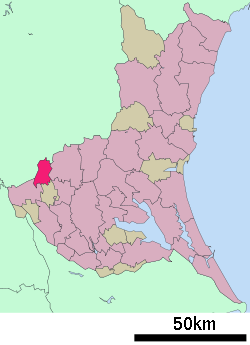Yūki, Ibaraki
| Yūki 結城市 | |||
|---|---|---|---|
| City | |||
|
Yūki city hall | |||
| |||
 Location of Yūki in Ibaraki Prefecture | |||
 Yūki
| |||
| Coordinates: 36°18′19.7″N 139°52′35.9″E / 36.305472°N 139.876639°ECoordinates: 36°18′19.7″N 139°52′35.9″E / 36.305472°N 139.876639°E | |||
| Country | Japan | ||
| Region | Kantō | ||
| Prefecture | Ibaraki Prefecture | ||
| Government | |||
| • Mayor | Fumio Zenba (since August 2011) | ||
| Area | |||
| • Total | 65.76 km2 (25.39 sq mi) | ||
| Population (September 2015) | |||
| • Total | 51,429 | ||
| • Density | 782/km2 (2,030/sq mi) | ||
| Time zone | Japan Standard Time (UTC+9) | ||
| - Tree | Mulberry | ||
| - Flower | Lilium | ||
| Phone number | 0296-32-1111 | ||
| Address | Oji-Yuki 1447, Yuki-shi, Ibaraki-ken 307-8501 | ||
| Website | Official website | ||
Yūki (結城市 Yūki-shi) is a city located in Ibaraki Prefecture, in the northern Kantō region of Japan. As of September 2015, the city had an estimated population of 51,429 and a population density of 782 persons per km². Its total area was 65.76 square kilometres (25.39 sq mi). Yūki is famous for Yūki-tsumugi traditional Japanese weavings including cloth and paper, and has a rich religious history with many older Buddhist temples and Shinto shrines. There is a relatively large population of people of Brazilian, Filipino, Peruvian, and mixed descent.
Geography
Yūki is located in far western Ibaraki Prefecture, bordered by Tochigi Prefecture to the west. The Kinugawa River flows through the city.
Surrounding municipalities
History
The area of Yūki was an important center for the production of cotton, flax and woven goods from the Nara period. From the Kamakura period onwards, the area was controlled by the Yūki clan, who developed a castle town around Yūki Castle. This subsequently became the center of Yūki Domain which was ruled by 10 generations of a junior branch of the Mizuno clan under the Tokugawa shogunate in the Edo period. The town of Yūki was created with the establishment of the municipalities system on April 1, 1889. On March 15, 1954 Yūki merged with the neighboring villages of Yamakawa, Kinugawa, Egawa and Kamiyamakawa and was elevated to city status.
Economy
Yūki has an industrial park, however, the local economy remains based on agriculture and food processing.
Education
Yūki has nine elementary schools, three middle schools, and three high schools.
Transportation
Railway
Highway
Sister city relations
Local attractions
- site of Yūki Castle
- grave of Mizuno Tadakuni
- Yūki old town with old warehouses
Noted people from Yūki
- Katsumi Hirosawa, baseball player
- Yukie Nakayama, sport shooter
References
- ↑ "Yuki (Ibaraki) & Mechelen (Antwerp)". Sister Cities. Embassy of Japan in Belgium. 2013. Retrieved 13 December 2015.
External links
| Wikimedia Commons has media related to Yūki, Ibaraki. |
- Official website (Japanese)
